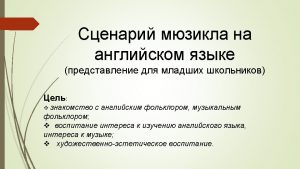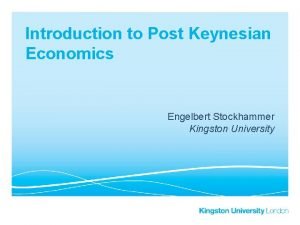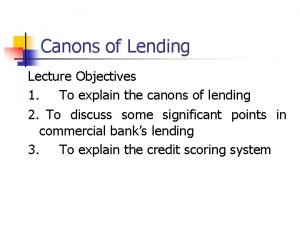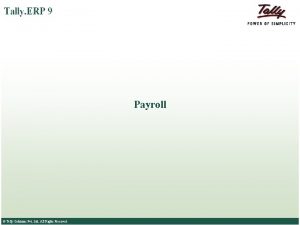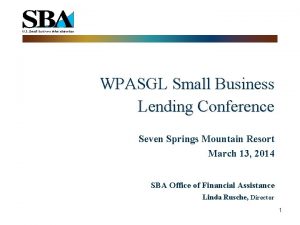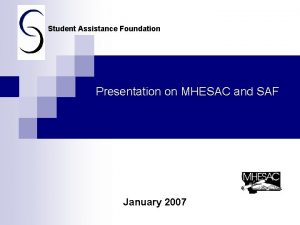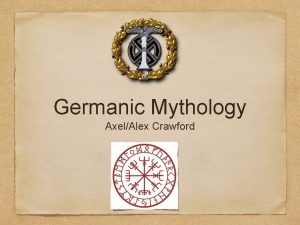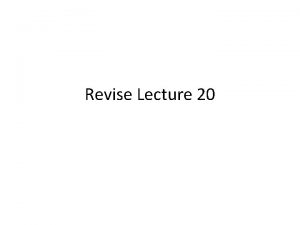Latin Loans Latin Loans into Germanic into Old





















































- Slides: 53

Latin Loans



Latin Loans • • into Germanic into Old English into Middle English into Early Modern English


Latin Loans: dating Latin cuprum, OE copor, Engl. copper How do we know this is a loanword? Indo-European k–p-r Latin cuprum Germanic h–f -r Grimm's Law

Latin Loans: dating Latin cuprum, OE copor, Engl. copper How do we know this is a loanword into early Germanic? English German Dutch Dan - Nor Swedish Icelandic copper Kupfer koper kobber koppar kopar

Latin Loans: dating Latin cuprum, OE copor, Engl. copper How do we know this is a loanword into early Germanic? Latin in Gaul changed -pr- to -vr- in 7 th cent. - Modern French cuivre So it must have come into Germanic earlier than the 7 th cent.

1. Latin Loans: into Germanic Latin balteus 'girdle' puteus 'pit' crédo 'i believe' OE belt pytt créda 'creed' * * uncia 'twelfth part' diaconus 'deacon' Sagéna 'Seine' pulvinus 'cushion' sabbatum 'sabbath' cucina 'kitchen' catillus 'small dish' ynce 'inch' diacon Segne pyle 'pillow' sabat cycene 'kitchen' cetel 'kettle' * * *

1. Latin Loans: into Germanic vowel mutation, umlaut, hljóðvarp u – mutation: dagur-dögum, krati krötum, land lönd i-mutation: dagur degi, fótur fæti

1. Latin Loans: into Germanic vowel mutation, umlaut, hljóðvarp Do not confuse with: vowel gradation, ablaut, hljóðskipti sing sang song bjóða beið buðum boðið

1. Latin Loans: into Germanic vowel mutation, umlaut, hljóðvarp i-mutation occurred before the earliest extant records of OE in 6 th cent. words that underwent this change must have arrived in English before that date.

i-mutation in Old English, before 6 th cent. æ>e a>e o>e u>y ea > ie > y eo > ie > y io > ie > y á>ǽ ó>é ú>ý éa > íe > ý éo > íe > ý ío > íe > ý

1. Latin Loans: into Germanic Latin balteus 'girdle' puteus 'pit' crédo 'i believe' OE belt pytt créda 'creed' * * uncia 'twelfth part' diaconus 'deacon' Sagéna 'Seine' pulvinus 'cushion' sabbatum 'sabbath' cucina 'kitchen' catillus 'small dish' ynce 'inch' diacon Segne pyle 'pillow' sabat cycene 'kitchen' cetel 'kettle' * * *

1. Latin Loans: into Germanic breaking a → ea / ___ r. C, l. C, h “a becomes ea before r+consonant, l+consonant, and h” half > healf early in the OE period (before records)

1. Latin Loans: into Germanic Latin vallum 'wall' arca 'chest' calcem 'lime' OE weall earc cealc 'chalk

1. Latin Loans: into Germanic Compare with later loans: abbadem 'abbot' camélus sanctus abbad camel sanct 'saint'

1. Latin Loans: into Germanic For more words from this period: Baugh § 58 p. 79 “Continental Borrowing (Latin Influences of the Zero Period)”

2. Latin Loans: into Old English

i-mutation breaking

2. Latin Loans: into Old English Latin loans which do not show i-mutation or breaking must have entered the language after the 6 th century. Germanic Before the OE period

Before or during the OE period? Latin moneta 'money' cometa 'comet' coquina 'kitchen' coquus 'cook' OE mynet 'mint' cometa cycene cóc abbadem 'abbot' camélus sanctus abbad camel sanct 'saint'

Before or during the OE period? LATIN OLD ENGLISH moneta i-mutation mynet cometa comet

Before or during the OE period? LATIN OLD ENGLISH coquina cōcus ? ? i-mutation cycene cóc

2. Latin Loans: into Old English OE period


2. Latin Loans: into Old English • Baugh § 59 p. 81 Latin through Celtic (Latin Influence of the First Period) castra ‘camp' -ceaster vicus ‘village, district' wíc Manchester, Doncaster Norwich, Greenwich, Sandwich, Berwick vinum ‘wine' wín

2. Latin Loans: into Old English • Baugh § 60 -62 p. 82 -87 Latin Influence of the Second Period: the Christianizing of Britain candela candel nona hora ‘ninth hour' nón ‘three o’clock in the afternoon’ presbyter ‘priest' préost

2. Latin Loans: into Old English • Baugh § 63 -5 p. 87 -91 Later borrowings: Christianity, science apostle cantor prophet history paper term cucumber ginger cyprus fig laurel cancer plaster

3. Latin Loans: into Middle English


3. Latin Loans: into Middle English • This process continues in Middle English as science and technology progresses. • Both French and English took learned words from Latin; it is not always possible to say whether a loan into English comes through French or straight from Latin.

3. Latin Loans: into Middle English • Baugh § 142 p. 184 “Latin Borrowings in Middle English” adjacent frustrate genius incredible index interrupt quiet solitary suppress testimony

3. Latin Loans: into Middle English • § 143 p. 185 “Aureate Terms” conscious introduction of ornate and unusual words which have since died out: abusion dispone diurne - although some have been retained mediation oriental

3. Latin Loans: into Middle English • § 144 p. 186 “Synonyms on three levels” fire – flame – conflagration time – age - epoch • Saxon – “strong, simple, direct” • French – stylistic • Latin – learned, bookish Baugh points out that large numbers of French words are no less robust and powerful than English ones, and that this distinction is to some extent based on prejudice

Baugh p. 186

Baugh 144 continued – ignore the many hundreds of words from French which are equally simple and as capable of conveying a vivid image, idea, or emotion-nouns like bar, beak, cell, cry, fool, frown, fury, glory, guile, gullet, horror, humor, isle, pity, river, rock, ruin, stain, stuff, touch, wreck, or adjectives such as calm, clear, cruel, eager, fierce, gay, mean, rude, safe, tender, to take examples almost at random. The truth is that many of the most vivid and forceful words in English are French, and even where the French and Latin words are more literary or learned, as indeed they often are, they are no less valuable and important.

continued. . The richness of English in synonyms is largely due to the happy mingling of Latin, French, and native elements. It has been said that we have a synonym at each level-popular, literary, and learned. Although this statement must not be pressed too hard, a difference is often apparent, as in rise mount ascend, ask question interrogate, goodness virtue probity, fast firm secure, fire flame conflagration, fear terror trepidation, holy sacred consecrated, time age epoch. In each of these sets of three words the first is English, the second is from French, and the third from Latin. The difference in tone between the English and the French words is often slight; the Latin word is generally more bookish. However, it is more important to recognize the distinctive uses of each than to form prejudices in favor of one group above another.

4. Latin Loans: into Early Modern English


4. Latin Loans: into Early Modern English • The beginning of the end for Latin as a scientific language. • Number of Latin loans increases as the use of Latin as a written language begins to decline (cf French loanwords)

4. Latin Loans: into Early Modern English • Shakespeare’s 20 years in London Effectual effectuous effectful effectuating effective – Many of the words objected to have now become common – Often different meanings when first introduced expect (wait) enlargement (freedom) humorous (wet, damp)

Baugh § 157 p. 214

Baugh § 157 p. 216 -7

4. Latin Loans: into Early Modern English • “Inkhorn terms” § 158 p. 217

Baugh § 158 p. 217 Sir John Cheke, 1561

Thomas Wilson, Arte of Rhetorique 1553 Baugh p. 218




4. Latin Loans: into Early Modern English • “Inkhorn terms” § 158 p. 217 – read particularlythe quote frm Thomas Wilson’s Arte of Rhetorique on p. 218 – and the next 2 sections, § 159 The Defense of Borrowing and § 160 Compromise.

Baugh p. 221, George Pettie:

 Language english
Language english Ancient german language
Ancient german language Charlemagne accomplishments
Charlemagne accomplishments Effects of germanic invasions
Effects of germanic invasions Are slavs germanic
Are slavs germanic Germanic romance slavic
Germanic romance slavic Are scandinavians germanic
Are scandinavians germanic Feudalism
Feudalism Germanic branch
Germanic branch Germanic branch definition ap human geography
Germanic branch definition ap human geography Germanic kingdom
Germanic kingdom Continental legal system
Continental legal system Charlemagne unites germanic kingdoms
Charlemagne unites germanic kingdoms Effects of germanic invasions
Effects of germanic invasions Once upon a time there lived an old man and an old woman
Once upon a time there lived an old man and an old woman What is your name and how old are you?
What is your name and how old are you? Once upon a time there lived a very poor boy
Once upon a time there lived a very poor boy Once upon a time there was a fox
Once upon a time there was a fox Latin old language
Latin old language What severely dampened commerce
What severely dampened commerce Student lending analytics
Student lending analytics Advancing loans
Advancing loans Lsk sacco loans
Lsk sacco loans Vanderbilt student loans
Vanderbilt student loans Nsclsc
Nsclsc Engelbert stockhammer
Engelbert stockhammer Loan vocabulary
Loan vocabulary Short term loans and advances
Short term loans and advances Caplines
Caplines Alaska student loans
Alaska student loans Paced decision making
Paced decision making Pricing business loans
Pricing business loans Mefa loans
Mefa loans Canons of lending are
Canons of lending are Absa homeloan payment holiday
Absa homeloan payment holiday Features of money market
Features of money market Inventory loan
Inventory loan Fha connection
Fha connection Loan performer software free download
Loan performer software free download Banks extend many fixed-rate loans
Banks extend many fixed-rate loans Section 8-1 single payment loans
Section 8-1 single payment loans Lendpinoy
Lendpinoy Taly payroll
Taly payroll Small business loans in seven springs nc
Small business loans in seven springs nc Imarisha maisha loans
Imarisha maisha loans Payday loan customer acquisition
Payday loan customer acquisition Bar study loans
Bar study loans Fha 203h disaster loan
Fha 203h disaster loan Westpac prebuilt loans
Westpac prebuilt loans Loans examples
Loans examples Mhesac
Mhesac Pure discount loan formula
Pure discount loan formula Tsahc loan
Tsahc loan Nslsc
Nslsc














